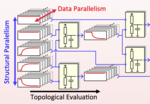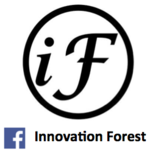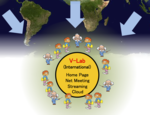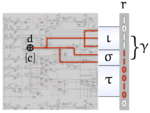
Hi, I'm Stefan
VLSI Research - Smart Device Development - Global Education
Hi, I'm Stefan
VLSI Research
Smart Device Development
Global Education
Complex VLSI computer chips and smart devices continue to shape our daily lives, solve pressing problems, and create new opportunities. My research helps making future chips and smart devices more powerful, more reliable and more energy-efficient.
Information technology is a global business. That is why I'm committed to educate our future generation of engineers and researchers towards a critical yet open mind-set and the skills to flourish on a planetary scale.
Find out more about my activities on this site.
High-Performance VLSI Simulation
 Together with my colleagues from University of Stuttgart, Germany, we are currently developing new logic-level and transistor-level simulation algorithms running on graphics processing units that provide enormous performance boosts over classical algorithms for various applications in test, diagnosis and power estimation.
As data movement (e.g. memory accesses) are now much more costly than computations themselves, these new algorithms focus on efficient memory organization and data management to provide maximum simulation speed.
Together with my colleagues from University of Stuttgart, Germany, we are currently developing new logic-level and transistor-level simulation algorithms running on graphics processing units that provide enormous performance boosts over classical algorithms for various applications in test, diagnosis and power estimation.
As data movement (e.g. memory accesses) are now much more costly than computations themselves, these new algorithms focus on efficient memory organization and data management to provide maximum simulation speed.
Smart Rehabilitation Devices
 Recovering after an accident, an operation or a serious illness takes a lot of time and effort.
In rehabilitation, patients conduct a series of exercises under supervision of a trainer to re-gain strength and mobility.
Together with Moriwaka Medical and Kanmon Health Center in Shimonoseki, we develop new methods to objectively monitor the rehabilitation progresses in order to help trainers and physicians adapting the training programs better to the individual needs of their patients.
Recovering after an accident, an operation or a serious illness takes a lot of time and effort.
In rehabilitation, patients conduct a series of exercises under supervision of a trainer to re-gain strength and mobility.
Together with Moriwaka Medical and Kanmon Health Center in Shimonoseki, we develop new methods to objectively monitor the rehabilitation progresses in order to help trainers and physicians adapting the training programs better to the individual needs of their patients.
Virtual Global LAB
 For graduates to thrive in our globalized world, proactivity, creativity, flexibility, communication and intercultural experience are essential.
The Virtual Global LAB brings students from different universities, various backgrounds, countries and cultures together to work on common projects and conducting exciting research. Fostering design thinking, self-governed problem-solving and an open, safe and tolerant culture, V-LAB provides ideal training environment for the next generation of researchers and engineers.
For graduates to thrive in our globalized world, proactivity, creativity, flexibility, communication and intercultural experience are essential.
The Virtual Global LAB brings students from different universities, various backgrounds, countries and cultures together to work on common projects and conducting exciting research. Fostering design thinking, self-governed problem-solving and an open, safe and tolerant culture, V-LAB provides ideal training environment for the next generation of researchers and engineers.
Logic Diagnosis
 Logic diagnosis is the task of finding defects within a logic circuit based on its faulty behavior.
Fast and accurate algorithms for logic diagnosis are an integral part of modern chip development.
Based on a new fault modeling approach, I developed a
new location-based diagnosis approach called POINTER, which can identify
defective structures on the chip even if the chip operates
unpredictably.
POINTER performs much better than previous methods and enabled logic diagnosis on extremely compacted test responses for the first time.
Logic diagnosis is the task of finding defects within a logic circuit based on its faulty behavior.
Fast and accurate algorithms for logic diagnosis are an integral part of modern chip development.
Based on a new fault modeling approach, I developed a
new location-based diagnosis approach called POINTER, which can identify
defective structures on the chip even if the chip operates
unpredictably.
POINTER performs much better than previous methods and enabled logic diagnosis on extremely compacted test responses for the first time.
Dependable Systems Research Center
 The mission of the Dependable Integrated Systems Research Center (DISC) is to foster basic research for the next generation highly reliable and high-quality integrated systems, and to spear-head their application for creating the safe and secure information society of the future.
The mission of the Dependable Integrated Systems Research Center (DISC) is to foster basic research for the next generation highly reliable and high-quality integrated systems, and to spear-head their application for creating the safe and secure information society of the future.
Kyushu Institute of Technology
 KIT is a public university located in southwestern Japan. It enjoys excellent reputation in industry and a very high employment rate of its graduates. KIT is pushing
strongly for innovative forms of training, internationalization of its learning environment and global competency of its graduates.
Cutting-edge research is conducted in many fields including computer science, biotechnology and aerospace.
KIT is a public university located in southwestern Japan. It enjoys excellent reputation in industry and a very high employment rate of its graduates. KIT is pushing
strongly for innovative forms of training, internationalization of its learning environment and global competency of its graduates.
Cutting-edge research is conducted in many fields including computer science, biotechnology and aerospace.